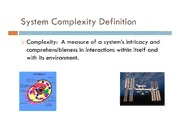
NASA Technical Reports Server (NTRS) 20150002939: Complex Systems at NASA - Help from Natural Systems PDF
Preview NASA Technical Reports Server (NTRS) 20150002939: Complex Systems at NASA - Help from Natural Systems
Complex Systems at NASA – Help from Natural Systems Michael D. Watson, Ph.D., NASA MSFC System Engineering Management Office Outline 2 Systems Engineering Characteristics Systems Engineering Framework System Complexity Nature provides the examples Definition Properties Modeling Properties Model Selection Lessons Learned from Natural Systems Summary System Engineering Research Consortium Focus System Engineering of Complex Systems is not well understood System Engineering of Complex Systems is Challenging System Engineering can produce elegant solutions in some instances System Engineering can produce embarrassing failures in some instances Within NASA, System Engineering is frequently unable to maintain complex system designs within budget, schedule, and performance constraints “How do we Fix System Engineering?” Michael D. Griffin, 61st International Astronautical Congress, Prague, Czech Republic, September 27- October 1, 2010 Successful practice in System Engineering is frequently based on the ability of the lead system engineer, rather than on the approach of system engineering in general The rules and properties that govern complex systems are not well defined in order to define system elegance 4 characteristics of system elegance proposed as: System Effectiveness System Efficiency System Robustness Minimizing Unintended Consequences Approach Define basis of System Engineering as an Engineering Discipline Three (3) thrusts to accomplish this System Works Understanding objectively what works in current system development (SLS) Follow SLS through DCR to study full development phase (once in 40 year opportunity) Distill the laws governing system engineering in complex systems by studying this approach through a combination of academic research with practicing system engineers Document the laws governing complex system interactions identified in the research Capture practical guidance from the research in a System Engineering Practitioner’s Guide System Design Apply the laws of governing Complex Systems in an elegant manner in the next major complex system development (Mars Transportation System) Apply and refine guidance in System Engineering Practitioner’s Guide System Academy Train new and practicing system engineers in the engineering basis of the discipline Preliminary Academic Curriculum Current work force training courses Consortium Research Process Missouri University of Science and Technology - System Exergy – Dave Riggins Multi-disciplinary research group that spans systems engineering areas GWU Space Policy Institute – Application of Policy and Law – Zoe Szajnfarber Selected researchers who are product rather than process focused Schafer Corporation – Mike Griffin List of Consortium Members Previous Consortium Members UAH – Phil Farrington, Paul Collopy, Dawn Utley, Laird Stevens Institute of Technology – Dinesh Verma Burns, Wes Colley, Bryan Mesmer, Bob Ryan, & Joey Spaceworks – John Olds (Cost Modeling Statistics) Shelton Alabama A&M – Emeka Dunu (Supply Chain System Cost Modeling – Paul Collopy Management) System Exergy – PJ Benefield, Bryan Mesmer, Joey Shelton George Mason – John Gero (Agent Based Modeling) System Complexity, Chief Engineer Interviews – Laird Oregon State – Irem Tumer (Electrical Power Grid Burns Robustness) Program/Engineering Decision Making – Dawn Utley Arkansas – David Jensen (Failure Categorization) UCCS– Disciplinary Formalization of System Engineering - Stephen Johnson Texas A&M – Designing Robust Engineered Systems - Richard Malak MIT – Informal representation and team decision- making in Complex Engineering Systems - Maria Yang Iowa State – SE Processes Evaluation - Paul Componation University of Dayton – System Exergy – John Doty 20 graduate students and 3 undergraduate students supported to date System Engineering Framework Mapping 6 System Complexity: Natural or Engineered? 7 Complex systems are the result of human engineering efforts Space Launch System Electrical Power Plants Ships IkataNuclear Power Plant, Japan, USS Enterprise, Wikipedia Wikipedia Complex systems/Complex Adaptive Systems naturally occur in nature Cell Structure Ecosystems Meteorology Bromeliad Hubble Extreme Deep Space Launch Cosmology Wikipedia Field Image -NASA System (SLS) Elmhurst College Do these Complex Systems follow the same relationship rules? Atmospheric True Color Data -NOAA System Complexity: Natural or Engineered or Both? 8 Do these Complex Systems follow the same relationship rules? This is a question still to be answered. Complex Systems/Complex Adaptive Systems originate from human engineering and naturally Systems Engineers seek to produce a system for some benefit to society and culture (exploration, trade, defense) These are becoming more complex systems and complex adaptive systems Complex systems/complex adaptive systems are engineered by natural complex systems (organizations) Natural systems provide a learning ground for understanding complex systems and complex adaptive systems These natural systems are believed to have the same basic properties of complexity that human engineered systems seek to attain This is a point that needs further definition and mathematical proof Atmospheric True Color Data -NOAA System Complexity Definition Complexity: A measure of a system’s intricacy and comprehensibleness in interactions within itself and with its environment. System Complexity Properties Properties: Complex systems have a propensity to exhibit unexpected performance of intended function Complex systems are aggregations of less complex systems Complex systems exhibit properties not present in the individual subsystems but present in the integration of subsystems (emergent property) Complex system interactions form networks within the system and with the system environments Complex system interactions can be understood through control theory Complex systems exhibit nonlinear responses to system stimuli Complex systems are difficult to predict Complex systems have local optimums (Organizational Efficiency Determines ability to achieve local optimum) Complex systems can be analyzed using two concepts: laws (rules of interaction) states (current state and prior history)
